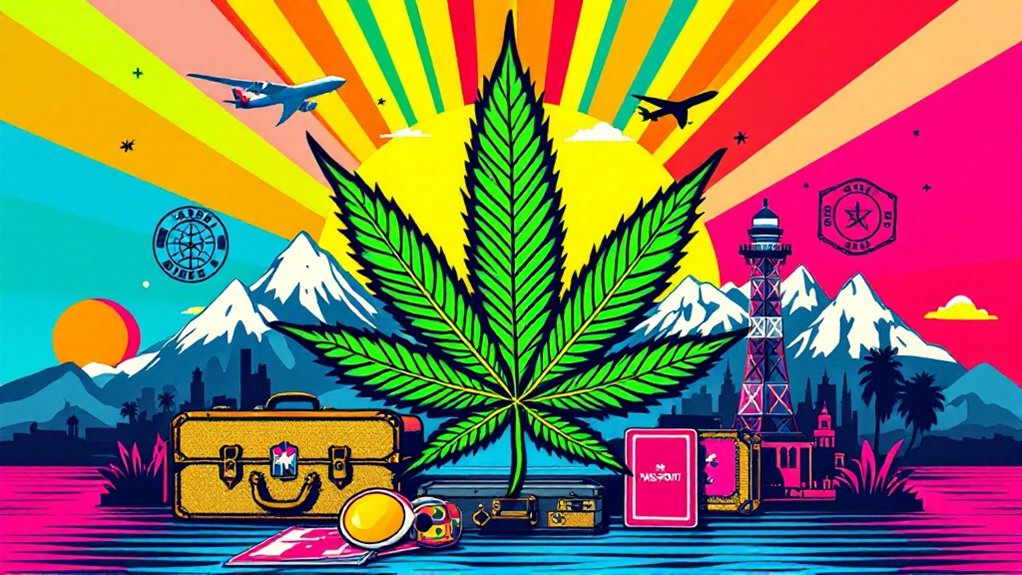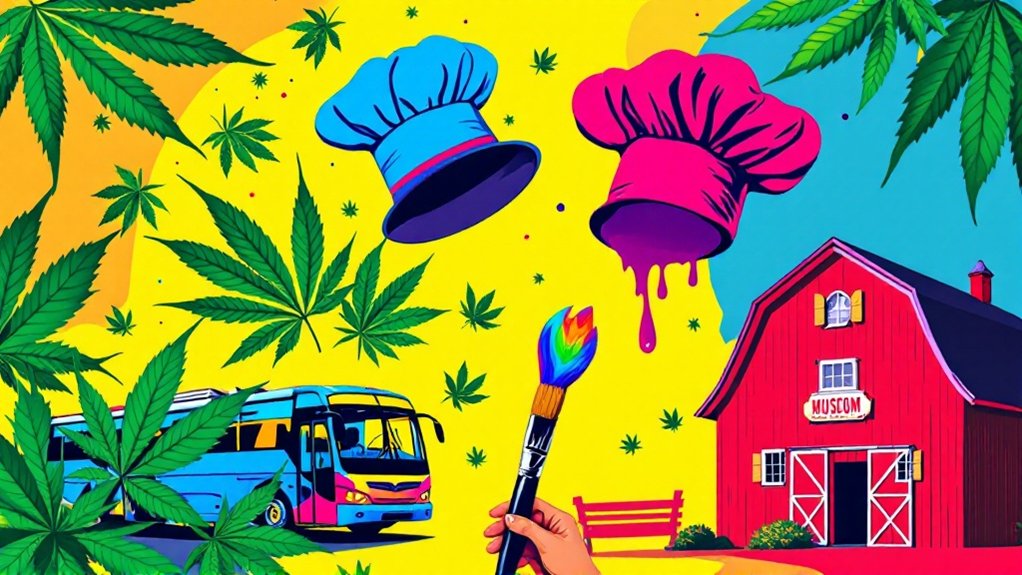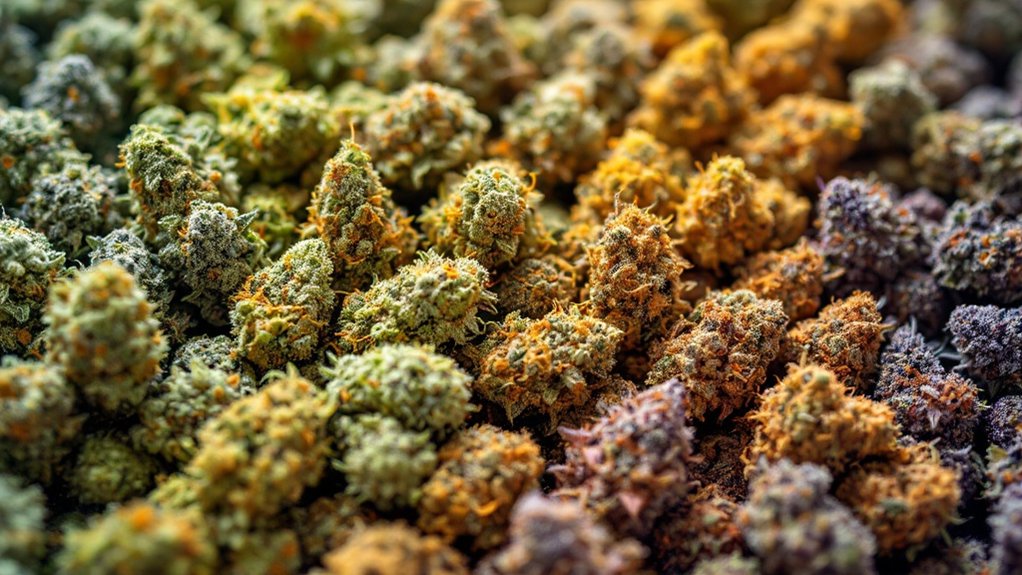Picture this: You’re sipping a perfectly dosed cannabis-infused cocktail while watching the Colorado sunset from a mountain resort’s private deck. Your afternoon included a guided tour through an artisanal cultivation facility, a cannabis-and-cheese pairing session led by a sommelier, and a massage with locally-crafted CBD oils. Tomorrow brings a foraging expedition followed by a farm-to-table dinner where each course is thoughtfully infused with terpenes that complement the local terroir.
This isn’t fantasy, it’s the reality of cannabis tourism in 2025, a $12.2 billion industry that’s redefining luxury travel for the culturally curious and lifestyle-conscious. While traditional tourism markets struggle with post-pandemic recovery, cannabis travel defies industry norms with an unprecedented 13.2% annual growth rate, projected to reach $25.7 billion by 2030.
Cannabis tourism represents more than just a travel trend, it’s the intersection of conscious consumption, cultural exploration, and sophisticated leisure. For travelers aged 30-45+, it offers something increasingly rare: authentic, transformative experiences that engage both mind and palate while supporting local communities and artisans.
Cannabis tourism has emerged as a legitimate travel sector, generating billions in revenue across legalized markets. States report measurable economic benefits from this niche market. Yet maneuvering the complex patchwork of regulations, consumption laws, and destination options requires careful planning that most travelers haven’t mastered.
Understanding the Cannabis Tourism Market and Its Rapid Growth

While traditional tourism markets grapple with post-pandemic recovery, the cannabis tourism sector is experiencing explosive growth that defies conventional travel industry trends. The global market reached $12.2 billion in 2024 and projects to soar to $25.7 billion by 2030, maintaining a robust 13.2% compound annual growth rate.
Cannabis tourism rockets past $12 billion globally while traditional travel struggles, defying industry norms with unprecedented 13.2% annual growth through 2030.
The United States dominates with over 50% market share, generating $3.2 billion annually. China emerges as an unexpected contender, forecasted to reach $4.0 billion by 2030 despite strict domestic policies.
The 25-44 age demographic drives expansion with the fastest growth rate at 14.9% annually, expected to capture $13.3 billion by decade’s end. This surge stems from expanding legalization across 19 U.S. states and countries like Germany, Canada, and South Africa. Colorado’s tourism industry demonstrates this impact with mountain region hotels earning $130 million following legalization. The sector benefits from the rise of experiential travel, as consumers increasingly seek unique cannabis-related experiences during their journeys.
Amsterdam’s regulatory tightening ironically accelerates global market diversification. With 88% of Americans supporting cannabis legalization for medical or recreational purposes, the tourism sector benefits from this overwhelming public acceptance. The numbers don’t lie, cannabis tourism represents one of travel’s most dynamic emerging sectors.
Beyond Amsterdam: The New Geography of Cannabis Culture
The cannabis tourism map has been completely redrawn. While Amsterdam’s coffeeshops remain iconic, today’s sophisticated cannabis travelers have their sights set on destinations that offer cultural depth, culinary innovation, and premium experiences.
San Francisco offers upscale dispensaries and cannabis-infused fine dining, while Burlington provides the highest concentration of weed-friendly accommodations at 103 per 100,000 residents. Ann Arbor has emerged as another notable destination, ranking 8th nationally for cannabis tourism and hosting the annual Hash Bash festival. These destinations collectively contribute to a rapidly expanding cannabis tourism market that grew by 20% from 2022 to 2024.
Denver: The Pioneer’s Sophisticated Evolution
Denver didn’t just legalize cannabis, it elevated it. With 10.4 dispensaries per 100,000 residents, the Mile High City has evolved far beyond its early “Napa Valley of Weed” aspirations. Today’s Denver cannabis scene blends outdoor adventure culture with urban sophistication.
The city’s 420 festivals have matured into multi-day cultural celebrations featuring renowned artists, acclaimed chefs, and educational seminars. Cannabis lounges offer climate-controlled environments where you can sample local strains while enjoying craft cocktails (non-infused, naturally) and live music. For the culturally inclined, cannabis-friendly art walks pair local gallery openings with carefully curated consumption experiences.
What sets Denver apart: The seamless integration of cannabis into the city’s adventure tourism infrastructure. Cannabis-friendly ski resorts, hiking tour companies, and even brewery collaborations create a uniquely Colorado experience where elevation meets elevated experiences.
Portland: Where Craft Cannabis Meets Creative Culture
Portland’s 55 dispensaries per 100,000 residents reflect the city’s commitment to small-batch, artisanal everything, including cannabis. This is where you’ll find “Puff, Pass & Paint” classes in converted warehouses, cannabis-paired wine tastings in urban wineries, and dispensaries that feel more like artisanal galleries than retail shops.
The city’s affordable accommodation options (averaging $161 per night) make it accessible for extended stays that allow deeper cultural immersion. Portland’s cannabis scene celebrates craft cultivation, sustainable farming practices, and the kind of creative experimentation that only happens when artists and cannabis connoisseurs collide.
Portland’s signature experience: Cannabis terroir tours that explore how Oregon’s diverse microclimates create distinct flavor profiles, followed by farm-to-table dinners where local chefs demonstrate advanced infusion techniques.
Las Vegas: Luxury Cannabis in the Entertainment Capital
Las Vegas brings its signature spectacle to cannabis tourism through venues like Planet 13, the world’s largest dispensary, complete with interactive displays and a consumption lounge that rivals the city’s best clubs. The Lexi, the Strip’s first cannabis-friendly hotel, features advanced air filtration systems and 24/7 room service that includes cannabis concierge services.
Vegas offers luxury cannabis experiences that match the city’s high-roller mentality: private strain consultations, cannabis-paired seven-course dinners by celebrity chefs, and VIP cannabis lounge access during major events. It’s cannabis tourism for those who prefer their experiences with a side of extravagance.
Emerging International Destinations
Bangkok has become Southeast Asia’s unexpected cannabis capital following Thailand’s 2022 legalization, with thousands of dispensaries creating a vibrant night market scene where neon cannabis leaf signs beckon international travelers seeking Asian-influenced products and traditional herbal medicine approaches.
Barcelona’s cannabis social clubs offer a sophisticated European alternative to Amsterdam’s tourist-heavy coffeeshops, with member-only venues that feel like exclusive cultural salons where locals and informed travelers gather for curated experiences.
Experiential Cannabis Travel: Beyond the Dispensary

Modern cannabis tourism transcends simple consumption, it’s about immersive experiences that engage all the senses and provide lasting memories worth sharing (responsibly) on social media.
Agricultural Tourism: From Seed to Sophistication
Humboldt County farm tours offer the cannabis equivalent of vineyard visits, complete with terroir education, sustainable farming demonstrations, and harvest season experiences. These aren’t just agricultural tours, they’re cultural immersions into the legacy cannabis community that shaped modern cultivation practices.
Visitors learn about organic cultivation methods, participate in harvest activities (during season), and engage with multigenerational farming families who treat cannabis cultivation as both art and science. Many tours conclude with vertical tastings that showcase how different harvest times and curing methods affect flavor profiles.
Culinary Cannabis Experiences
Cannabis-infused fine dining has evolved into one of tourism’s most sophisticated offerings. Portland’s cannabis supper clubs feature James Beard Award-nominated chefs who treat cannabis like any other premium ingredient, carefully balancing flavors and effects across multi-course tasting menus.
Cooking classes teach advanced infusion techniques, dosage control, and flavor pairing principles. These aren’t the pot brownies of yesterday, students learn to create cannabis-infused foams, tinctures, and oils that enhance rather than mask food flavors.
What makes it special: The focus on mindful consumption and culinary artistry rather than just getting high. These experiences attract food lovers who happen to enjoy cannabis, not just cannabis users looking for a meal.
Wellness and Retreat Experiences
Cannabis wellness retreats represent the therapeutic frontier of cannabis tourism, combining guided consumption with yoga, meditation, sound baths, and nature therapy. These experiences cater to the nearly 50% of participants who are cannabis novices—primarily busy professionals seeking stress relief and personal growth.
Hudson Valley retreats in upstate New York offer forest bathing with locally grown cannabis, creating deeper connections between participants and natural environments. California luxury resorts provide cannabis-infused spa treatments and CBD massages alongside educational workshops covering terpene profiles and endocannabinoid system science.
Participants report lasting benefits including improved sleep quality, enhanced creativity, and better pain management. Many describe emotional breakthroughs that lead to personal growth and feelings of renewal, outcomes that extend far beyond the retreat experience.
With 78 retreats planned across Latin America and 38 in New York for 2025, the industry reflects cannabis culture’s evolution from party-focused to therapeutic travel experiences.
Cultural and Creative Experiences
Cannabis museums offer educational venues featuring prohibition-era artifacts alongside exhibits on industry evolution and cannabis’s role in various cultures throughout history. These institutions legitimize cannabis culture through academic and historical presentation.
Puff-and-paint classes and cannabis-friendly comedy nights create social experiences that normalize consumption while fostering creativity and community connection. These activities attract participants who might not otherwise engage with cannabis culture, broadening the community’s demographic appeal.
Dispensary experiences focus on retail education, with guided tours explaining strain selection and consumption methods. Cannabis Passport programs in destinations like Modesto create curated multi-stop adventures.
Meanwhile, social activities range from comedy nights to scenic outdoor excursions, with party bus tours providing safe group transport between venues. Many destinations now offer specialized bud & breakfasts that provide 420-friendly boutique accommodations for overnight stays.
Legal Considerations and Safety Guidelines for Cannabis Travelers

Understanding the legal framework is essential for sophisticated cannabis travelers who want to avoid transforming their wellness retreat into a legal nightmare.
Current Legal Status
Recreational cannabis enjoys full legality in 24 U.S. states and Washington D.C., while medical cannabis reaches 38 states, covering over 70% of Americans. Canada legalized recreational use nationwide in 2018, creating a stable legal environment for cannabis tourism development.
However, federal law creates complications that sophisticated travelers must understand. Cannabis remains federally illegal in the United States, making transportation across state lines prohibited regardless of individual state laws. Airport security operates under federal jurisdiction, making possession at airports a federal offense even in legal states.
International Considerations
Border crossings present particular challenges. Canadian travelers admitting cannabis use can face U.S. entry denial, while any international border crossing with cannabis remains illegal, even between legal jurisdictions. This creates a complex planning requirement for multi-destination cannabis tourism.
Consumption restrictions typically limit use to private residences or designated areas, while public consumption carries penalties even in legal states. Age requirements vary, 21+ in U.S. states, 18-19+ in Canadian provinces through licensed dispensaries only.
Practical Planning Advice
Research destination laws thoroughly, as enforcement strictness varies dramatically between states with identical legal classifications. Purchase limits vary, 30 grams in Canada, one ounce in many U.S. states, requiring fresh purchases at each destination.
Airport amnesty bins in legal states help dispose of products before security checkpoints, where possession becomes a federal offense regardless of local laws.
Travelers should research destination laws thoroughly, as enforcement strictness varies dramatically between states with identical legal classifications.
Planning Your Cannabis Tourism Budget and Itinerary
Cannabis tourism destinations present budget considerations ranging from modest day trips to luxury multi-thousand-dollar experiences. Smart financial planning enhances the experience while avoiding tourist traps.
Budget Categories and Typical Costs
Accommodation: 420-friendly properties cost approximately 10-30% more than standard lodging, but offer valuable amenities like consumption areas, air filtration systems, and cannabis concierge services.
Tours and Activities: Package experiences typically range from $50-$300 per person. Guided dispensary tours and farm visits represent popular mid-range options, while cannabis cooking classes and infused dinners with renowned chefs command premium pricing.
Cannabis Products: Fresh purchases at each destination add up quickly. Budget-conscious travelers should research local pricing and purchase limits to avoid overspending on impulse purchases.
Event Passes: Festival tickets and cannabis competition access generally run $25-$100 each, offering opportunities to sample multiple vendors and attend educational seminars.
Money-Saving Strategies
Off-peak travel can reduce costs by up to 30% on hotels and flights while providing more intimate experiences with local operators. Cannabis festivals and major events drive up accommodation prices significantly.
Package deals often provide better value than individual bookings, especially for multi-day experiences that include accommodation, meals, and activities.
Financial experts recommend adding a 10-20% contingency for spontaneous purchases and experiences—cannabis tourism often presents unexpected opportunities worth exploring.
Economic Impact: How Cannabis Tourism Transforms Communities

Cannabis tourism generates significant economic benefits that extend far beyond dispensary sales, creating neighborhood-level economic stimulation that supports local businesses and creates jobs across multiple sectors.
The Multiplier Effect
Every $10 spent at dispensaries generates an additional $18 in the broader economy through ripple effects. Hotels, restaurants, entertainment venues, and service providers all benefit from cannabis tourism spending patterns.
Missouri exemplifies this impact, reaching $3.2 billion in adult-use sales since 2023 through combined tourism and local consumption. Colorado’s mountain region hotels earned $130 million following legalization, demonstrating tourism’s direct economic contribution.
Community Development Benefits
Cannabis tourism creates jobs in both cannabis operations and hospitality sectors, providing employment opportunities across skill levels. Smart entrepreneurs develop unique product formulations specifically for tourism markets, fostering innovation and differentiation.
The economic stimulation occurs primarily at neighborhood levels, supporting local artisans, restaurants, and service providers rather than just large corporate operations.
The Future of Cannabis Travel
As cannabis tourism matures, several trends point toward an even more sophisticated and diverse industry that caters to evolving consumer preferences and expanding legal markets.
Emerging Market Expansion
Future expansion targets emerging legal markets across Asia, Africa, and Latin America as regulations evolve. Thailand’s sudden emergence as a cannabis destination demonstrates how quickly new markets can develop sophisticated tourism offerings.
Germany’s recent legalization positions Europe for significant cannabis tourism growth, while South Africa’s constitutional court decisions create opportunities for African cannabis tourism development.
Technology and Personalization
AI-driven strain matching will help travelers find perfect products based on their preferences, genetics, and desired experiences. Blockchain verification may solve legal transportation challenges by providing verified product provenance across jurisdictions.
Personalized medicine approaches will make cannabis recommendations as precise as any other healthcare intervention, attracting health-conscious travelers seeking therapeutic benefits.
Sustainability and Social Responsibility
Environmental consciousness among cannabis travelers drives demand for sustainable cultivation practices and carbon-neutral tourism options. Social equity tourism connects travelers with minority-owned businesses and social justice initiatives.
Regenerative agriculture tours combine cannabis education with environmental stewardship, appealing to travelers who want their tourism dollars to support positive environmental impact.
Cannabis tourism represents the ultimate intersection of conscious consumption, cultural exploration, and sophisticated leisure. For the modern traveler seeking authentic experiences that engage both mind and palate while supporting local communities, cannabis tourism offers unparalleled opportunities for personal growth and cultural connection.
The industry’s rapid growth reflects a fundamental shift in how we approach both cannabis and travel, moving beyond simple consumption toward meaningful experiences that create lasting memories and positive impact. As legal markets expand and cultural acceptance deepens, cannabis tourism will continue evolving into one of travel’s most dynamic and rewarding sectors.
Ready to explore the world through a cannabis lens? The journey awaits and it’s more sophisticated, diverse, and transformative than you ever imagined.









